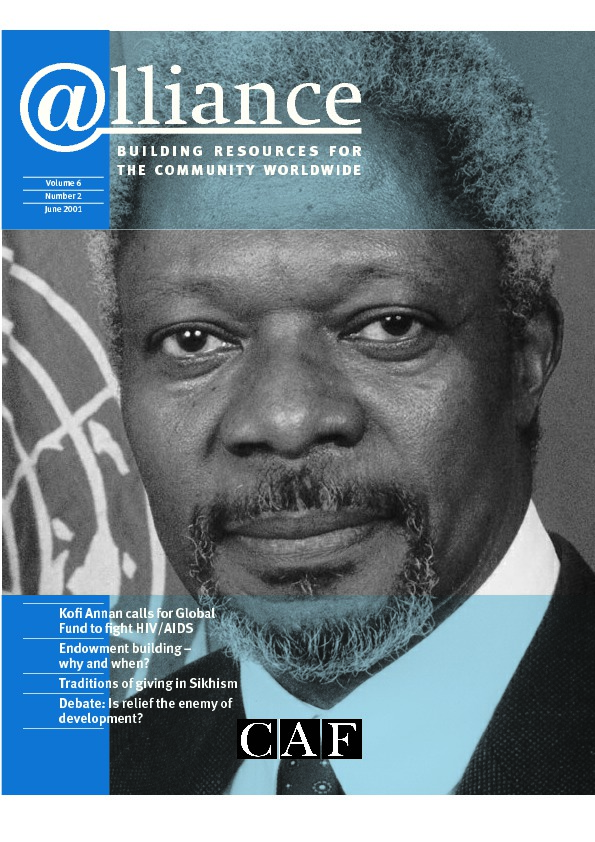In 1997, Ted Turner made front-page headlines around the world when he announced his US$1 billion donation to United Nations causes. He also caught the attention of the philanthropic community when he chose to channel his gift over a ten-year time frame, rather than set it up as an endowment.
Why not establish a permanent endowment? Because time is of the essence. In Ted Turner’s own words, ‘If we wait another ten or fifteen years, it will largely be too late. Population growth, climate change, mass extinction of species – these problems are big and getting bigger fast. They’re like snowballs rolling down a steep slope. Our challenge is to get at them before they reach avalanche proportion.’ In other words, Turner gave the UN Foundation (UNF) a ten-year time frame because the UN is facing problems that need answers now.
Narrowing the focus
When he made his gift, Turner recognized that $1 billion represented only a small fraction of the resources needed for the UN to do its job effectively. In order to have the greatest impact, UNF would focus on only four of the most pressing issues facing the international community: children’s health; environment; peace, security and human rights; and women and population. Within these four priority areas, the Foundation further narrowed its emphasis to focus ‘upstream’, on prevention.
Out of the seemingly endless list of threats facing the environment, the Foundation targeted resources on just two distinct areas: biodiversity and climate change. Both require dramatic and immediate responses that only the UN is equipped to provide. UNF further narrowed its biodiversity focus to provide support to UN efforts to conserve natural World Heritage sites and coral reefs.
Although Turner set a ten-year limit on the Foundation, he envisioned the solutions, resources and partnerships facilitated by UNF as being widely replicable and self-sustaining. UNF’s emphasis on polio eradication though its Children’s Health programme is a striking example. UNF support has engaged new partners in the UN-led eradication campaign and generated much-needed resources to help meet the eradication goal.
Building local capacity
Turner also recognized that long-term success would depend on the capacity of local communities to continue development activities well beyond the initial UNF investment. For this reason, community-based capacity-building is an integral component of UNF-funded projects. UNF’s response to the HIV/AIDS crisis in Africa focuses on equipping community leaders, such as teachers, elders and elected officials, with critical information and know-how to provide HIV/AIDS prevention services to high-risk populations, especially adolescent girls.
Turner’s innovative approach to philanthropy is demonstrating the power and importance of public-private partnerships. Partnerships between the UN and NGOs and the business community are more important than ever now because cuts in bilateral, government assistance are occurring at the very time that the demands for multilateral solutions are increasing.
These cuts in development assistance – down one-third from ten years ago – threaten the capacity of the UN to effectively address the world’s greatest challenges, such as HIV/AIDS. A well-resourced response for prevention and basic care programmes in Africa alone would require at least $3 billion a year, not including antiretroviral therapy. Yet only a fraction of this amount is available, despite growing evidence of political will and commitment.
UNF is committed to decreasing the gap between the massive global need and the current level of resources available to combat the AIDS pandemic and other global challenges. Only through intensified, coordinated and immediate action – between governments, businesses and NGOs – will the UN be able to accomplish its goals.
Timothy E Wirth is President of the United Nations Foundation. He can be contacted by email at twirth@unfoundation.org
Annan declares war on AIDS
UN Secretary-General Kofi Annan has called for a global multi-million dollar fund to be set up to halt and reverse the spread of AIDS in Africa. Speaking at a summit on AIDS in Africa in the Nigerian capital, Abuja, in late April, Annan said that between $7 billion and $10 billion are needed for the fight against AIDS to be effective. The summit, organized jointly by the Organization of African Unity and the World Health Organization, was attended by nearly 50 African heads of state and by former US president Bill Clinton.






Comments (0)